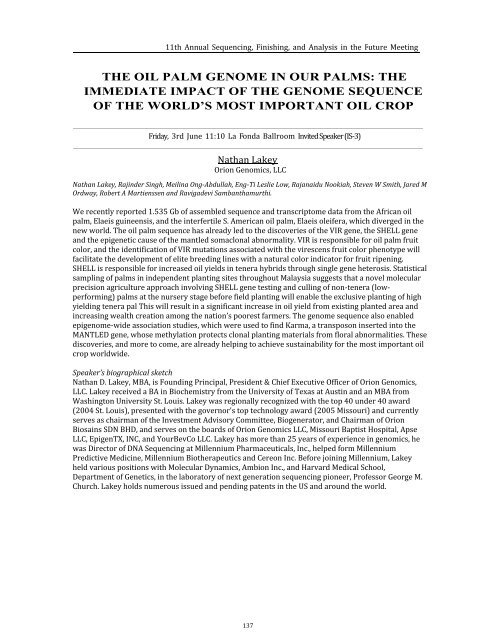Sequencing
SFAF2016%20Meeting%20Guide%20Final%203
SFAF2016%20Meeting%20Guide%20Final%203
Create successful ePaper yourself
Turn your PDF publications into a flip-book with our unique Google optimized e-Paper software.
11th Annual <strong>Sequencing</strong>, Finishing, and Analysis in the Future Meeting<br />
THE OIL PALM GENOME IN OUR PALMS: THE<br />
IMMEDIATE IMPACT OF THE GENOME SEQUENCE<br />
OF THE WORLD’S MOST IMPORTANT OIL CROP<br />
Friday, 3rd June 11:10 La Fonda Ballroom Invited Speaker (IS‐3)<br />
Nathan Lakey<br />
Orion Genomics, LLC<br />
Nathan Lakey, Rajinder Singh, Meilina Ong‐Abdullah, Eng‐Ti Leslie Low, Rajanaidu Nookiah, Steven W Smith, Jared M<br />
Ordway, Robert A Martienssen and Ravigadevi Sambanthamurthi.<br />
We recently reported 1.535 Gb of assembled sequence and transcriptome data from the African oil<br />
palm, Elaeis guineensis, and the interfertile S. American oil palm, Elaeis oleifera, which diverged in the<br />
new world. The oil palm sequence has already led to the discoveries of the VIR gene, the SHELL gene<br />
and the epigenetic cause of the mantled somaclonal abnormality. VIR is responsible for oil palm fruit<br />
color, and the identification of VIR mutations associated with the virescens fruit color phenotype will<br />
facilitate the development of elite breeding lines with a natural color indicator for fruit ripening.<br />
SHELL is responsible for increased oil yields in tenera hybrids through single gene heterosis. Statistical<br />
sampling of palms in independent planting sites throughout Malaysia suggests that a novel molecular<br />
precision agriculture approach involving SHELL gene testing and culling of non‐tenera (lowperforming)<br />
palms at the nursery stage before field planting will enable the exclusive planting of high<br />
yielding tenera pal This will result in a significant increase in oil yield from existing planted area and<br />
increasing wealth creation among the nation’s poorest farmers. The genome sequence also enabled<br />
epigenome‐wide association studies, which were used to find Karma, a transposon inserted into the<br />
MANTLED gene, whose methylation protects clonal planting materials from floral abnormalities. These<br />
discoveries, and more to come, are already helping to achieve sustainability for the most important oil<br />
crop worldwide.<br />
Speaker’s biographical sketch<br />
Nathan D. Lakey, MBA, is Founding Principal, President & Chief Executive Officer of Orion Genomics,<br />
LLC. Lakey received a BA in Biochemistry from the University of Texas at Austin and an MBA from<br />
Washington University St. Louis. Lakey was regionally recognized with the top 40 under 40 award<br />
(2004 St. Louis), presented with the governor's top technology award (2005 Missouri) and currently<br />
serves as chairman of the Investment Advisory Committee, Biogenerator, and Chairman of Orion<br />
Biosains SDN BHD, and serves on the boards of Orion Genomics LLC, Missouri Baptist Hospital, Apse<br />
LLC, EpigenTX, INC, and YourBevCo LLC. Lakey has more than 25 years of experience in genomics, he<br />
was Director of DNA <strong>Sequencing</strong> at Millennium Pharmaceuticals, Inc., helped form Millennium<br />
Predictive Medicine, Millennium Biotherapeutics and Cereon Inc. Before joining Millennium, Lakey<br />
held various positions with Molecular Dynamics, Ambion Inc., and Harvard Medical School,<br />
Department of Genetics, in the laboratory of next generation sequencing pioneer, Professor George M.<br />
Church. Lakey holds numerous issued and pending patents in the US and around the world.<br />
137


